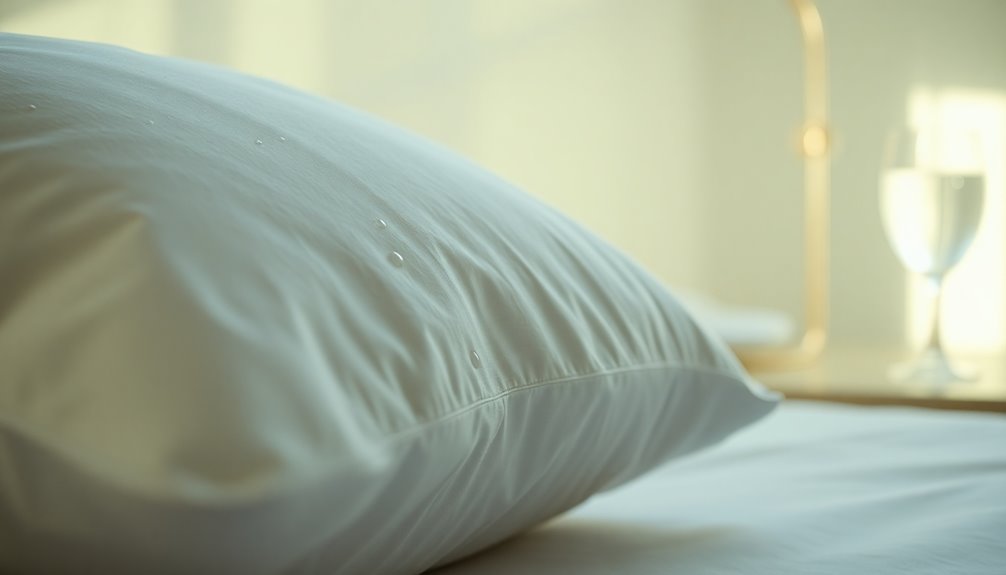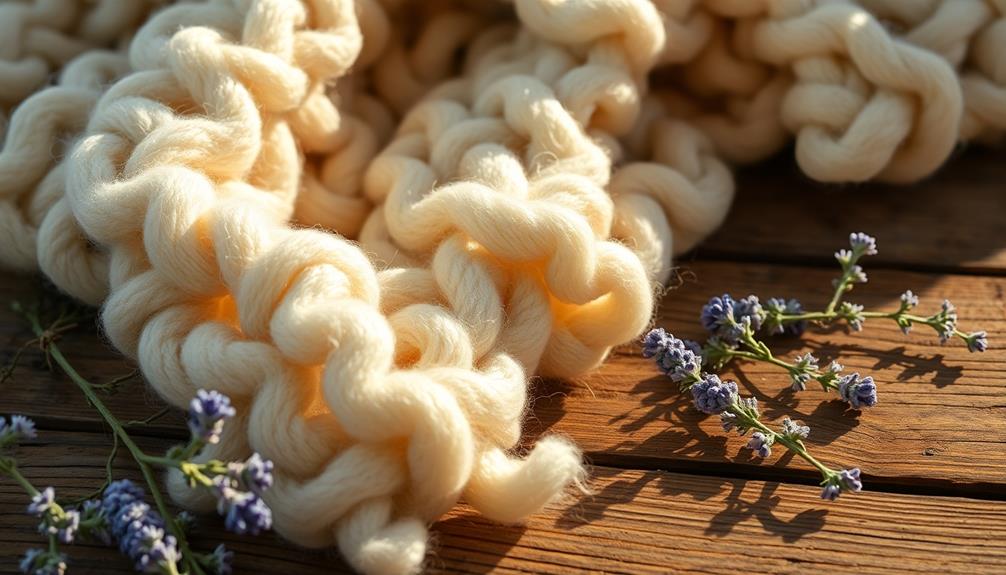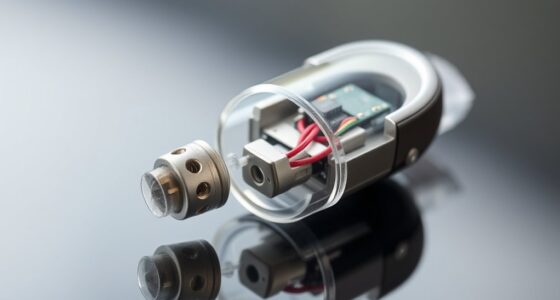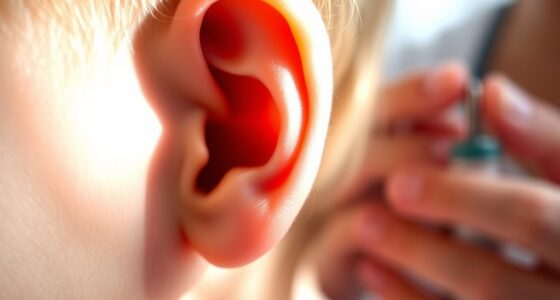Waking up with a wet ear can be surprising, but it often stems from earwax buildup, your sleeping position, and environmental factors. When you sleep on your side, gravity can cause earwax to drain, leading to moisture accumulation. Additionally, humidity and temperature changes can exacerbate the sensation. Sweat glands in your ears might produce extra fluid, especially in warmer conditions. Allergies or sinus issues can also obstruct normal drainage, contributing to the wetness. It's crucial to understand the underlying causes, so keep going to uncover more insights and strategies for addressing this common issue!
Key Takeaways
- Increased earwax production during sleep lubricates the ear canal, potentially causing wetness upon waking.
- Side-sleeping can hinder drainage, leading to fluid retention and a wet sensation in the ears.
- Humidity and temperature fluctuations overnight can contribute to moisture accumulation in the ear.
- Allergies or sinus issues may cause fluid buildup in the ears, exacerbating wetness.
- Non-breathable pillows can trap sweat and earwax, worsening the feeling of dampness in the ears.
Common Causes of Wet Ears
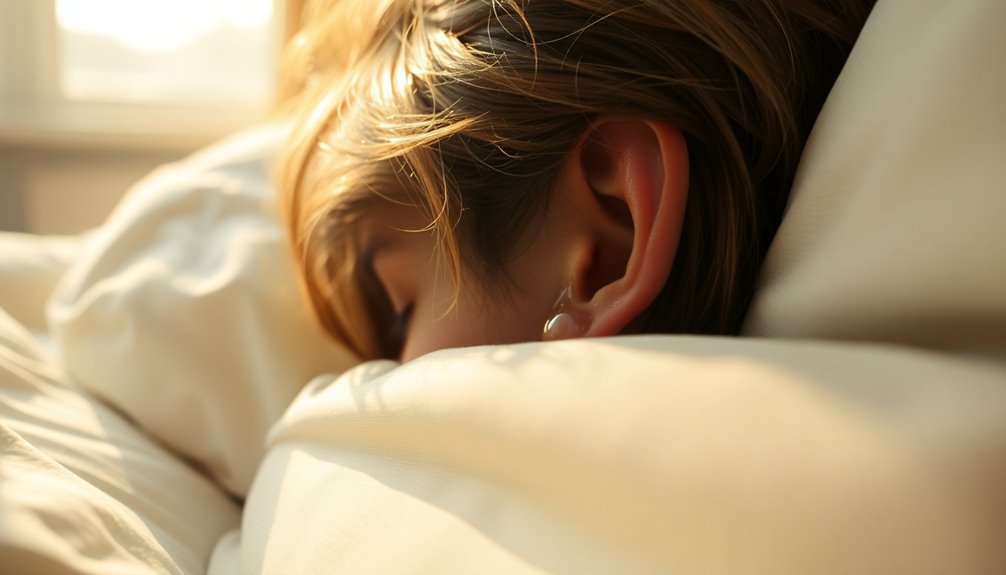
When you wake up with wet ears, several common causes might be at play. One likely reason is increased earwax production during sleep. Your body continues to generate cerumen to lubricate and protect the ear canal, and sometimes that extra wax can lead to a moist feeling.
Changes in your sleeping position may allow earwax to drain, contributing to the wetness you notice in the morning.
Humidity or temperature fluctuations overnight can also play a role. If your environment is particularly humid, moisture can accumulate in your ears, intensifying the sensation of wetness.
Additionally, allergies or sinus issues may lead to fluid buildup in your ears, especially if drainage is obstructed. This accumulation can manifest as wet ears upon waking.
Finally, if you use earphones or earbuds overnight, they might irritate your ear canal, prompting excess wax production. This irritation can contribute to that pesky wet feeling in the morning.
The Role of Earwax
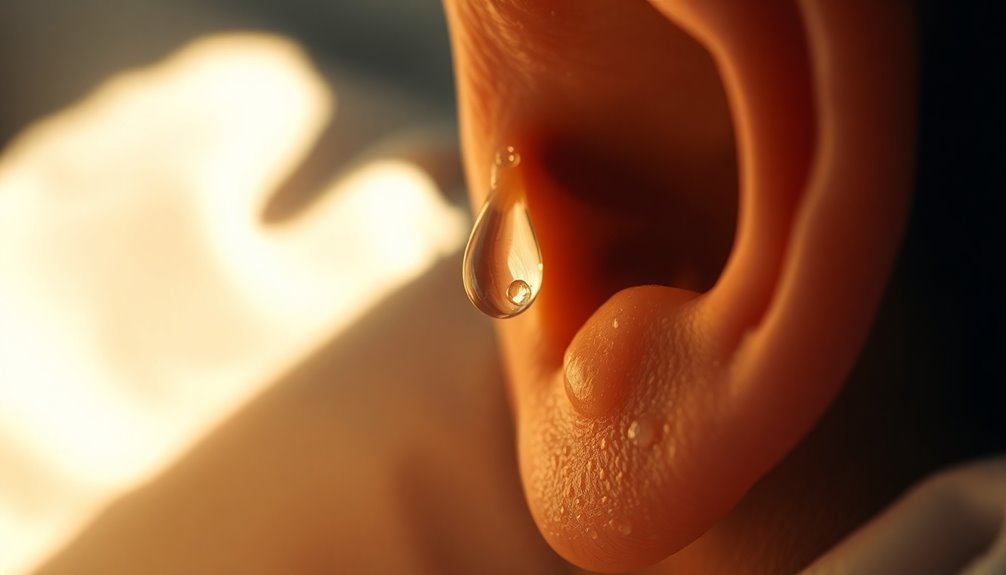
Earwax, or cerumen, plays an essential role in your ear health by forming a protective barrier against dirt and debris.
As it naturally moves outward through activities like chewing, it helps keep your ears clean and moisturized.
Understanding how earwax forms and its protective functions can shed light on why your ears might feel wet when you wake up.
Earwax Formation Process
The process of earwax formation plays an essential role in maintaining ear health. Earwax, or cerumen, is created from secretions of ceruminous and sebaceous glands, along with shed skin cells. This combination results in a natural moisturizer for your ear canal, crucial for keeping it healthy.
Here's how the earwax formation process works:
- Glandular secretions mix with skin cells.
- The mixture forms a protective barrier against dirt and bacteria.
- Freshly produced earwax tends to be lighter and wetter, often making your ear feel moist when you wake up.
- Chewing and jaw movement help expel earwax toward the outer ear, promoting self-cleaning.
Over time, earwax darkens and hardens, indicating its age and moisture content.
If you notice your ear feeling wet in the morning, it's likely due to the presence of fresh earwax that has been produced overnight. Genetic factors can also influence the amount and consistency of earwax you produce, ultimately affecting your ear health.
Understanding this process helps you appreciate why your ears behave the way they do.
Protective Functions of Earwax
A significant component of ear health, earwax serves multiple protective functions that keep your ears functioning at their best. You may not realize it, but earwax in your ear plays an essential role in maintaining your overall ear hygiene.
| Function | Description |
|---|---|
| Natural Skin Conditioner | Lubricates the ear canal, preventing dryness. |
| Traps Debris | Captures dust and dirt, keeping the canal clean. |
| Antimicrobial Properties | Provides a protective barrier against infections. |
| Self-Cleaning Mechanism | Promotes natural expulsion with jaw movement. |
Earwax buildup isn't just a nuisance; it's your body's way of protecting healthy ears. The composition of earwax includes sebum and antimicrobial proteins, which enhance its protective barrier against harmful bacteria. Additionally, its moisture retention properties enhance the ear canal's water resistance. When you chew or move your jaw, earwax naturally moves outward, helping to keep your ears clean and functioning effectively. Embracing earwax as a natural defense mechanism can lead to better ear health, ensuring your ears remain free from external irritants and infections.
Impact on Ear Health
Maintaining ear health relies heavily on the role earwax plays in your ears. This natural lubricant not only keeps your ear canal moist but also traps debris and dust, promoting cleanliness.
When you wake up with wet ears, it's often due to fresh earwax produced overnight, which contains more moisture than older, drier wax.
Here's how earwax contributes to your ear health:
- Traps debris: Earwax captures dust and foreign particles, preventing them from reaching the eardrum.
- Prevents dryness: It keeps the ear canal lubricated, reducing the risk of irritation and infection.
- Acts as a barrier: Fresh earwax provides a protective shield against bacteria, enhancing your body's defenses.
- Facilitates natural removal: The movement of your jaw during chewing helps expel old earwax, preventing impacted earwax.
To maintain ideal ear health, it's essential to clean your ears properly.
Avoid aggressive ear wax removal methods that can harm your ears. Instead, gently clean your ears to guarantee they remain healthy and free from blockage.
Impact of Sleeping Position
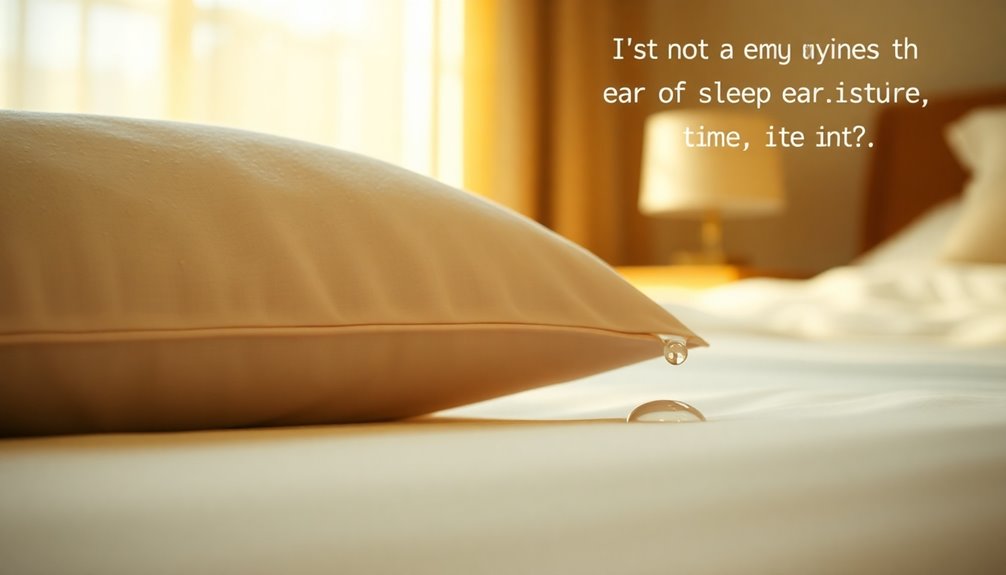
Your sleeping position can considerably affect how wet your ear feels in the morning.
When you sleep on your side, moisture and earwax may not drain properly, especially if your ear faces down.
Additionally, the materials in your pillow can influence irritation and fluid retention, so it's worth considering how you rest your head at night.
Side-Sleeping Effects
Side-sleeping can greatly influence the moisture levels in your ears. When you sleep on one side, fluid can drain from your ear, contributing to that "Wet When I Wake" feeling. This position also leads to the accumulation of sweat and earwax, particularly if you're in a humid environment.
Here are a few effects of side-sleeping you might notice:
- Fluid Drainage: Your ear might retain more moisture when lying on one side.
- Earwax Buildup: The position can hinder the natural expulsion of earwax, leading to increased retention.
- Sweat Accumulation: Heat and sweat can create a damp environment in your ear.
- Allergies: If you're allergic to your pillow material, inflammation might worsen the sensation.
To maintain clean ears and minimize these side-sleeping effects, consider changing your sleeping position regularly. This can help distribute moisture and wax more evenly, promoting better ear health.
Pillow Material Influence
The type of pillow you use can greatly affect how wet your ears feel when you wake up. If you sleep on your side, the pillow material may trap moisture and promote fluid drainage from the ear. Non-breathable materials can accumulate sweat and earwax overnight, leading to that uncomfortable wet sensation.
If your pillow is made from synthetic fibers or materials that don't allow air circulation, it could exacerbate moisture build-up. Allergic reactions to certain pillow materials can also cause inflammation, making you feel even wetter in the ear area.
Maintaining pillow hygiene is essential; dirty or infrequently washed pillows can irritate your ear canal and contribute to excess moisture. Regularly washing your pillow and using breathable covers can help mitigate this issue.
Additionally, consider changing your sleeping position throughout the night. This can help reduce the accumulation of moisture and improve overall ear comfort.
Fluid Drainage Dynamics
Sleeping in certain positions can greatly influence how fluids drain from your ears. If you tend to sleep on one side, gravity plays a role in the drainage of earwax and other fluids, often leading to a wet sensation when you wake up.
Here are some key factors to take into account regarding your sleeping position and moisture levels:
- Side Sleeping: This position can facilitate fluid drainage, but may also increase earwax buildup if you sleep on the same side regularly.
- Pillow Hygiene: Dirty pillows can harbor allergens and bacteria, contributing to irritation and moisture accumulation in your ear.
- Changing Positions: Switching sides throughout the night can help reduce fluid retention and minimize that wet feeling in the morning.
- Pressure Points: Prolonged pressure from your pillow can disrupt normal drainage, causing a buildup of moisture and earwax.
Effects of Humidity and Sweat
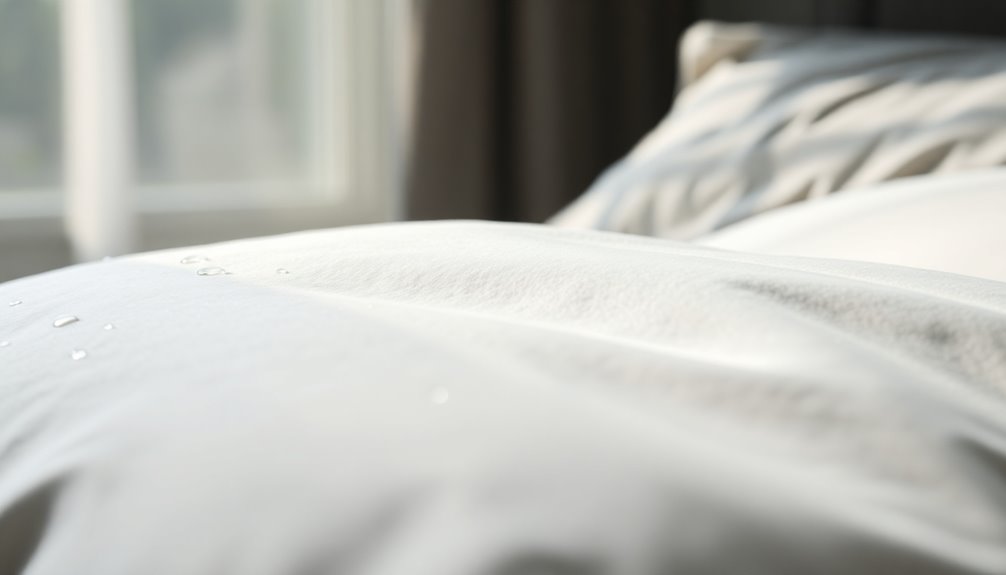
Humidity and sweat can wreak havoc on your ear health, especially when you wake up. High humidity levels often lead to moisture accumulation in your ears, as the sweat glands in your outer ears produce extra fluid in response to heat.
If you've been sleeping in a humid environment or sweating excessively during the night, you might notice that your ears feel damp upon waking. This excess moisture creates an ideal breeding ground for discomfort and irritation.
When sweat mixes with humidity, it can linger in your outer ears, increasing the risk of fungal infections. Keeping your ears dry is essential, particularly in humid conditions, to prevent these issues from developing.
Regularly cleaning and drying your outer ears can help mitigate the adverse effects of humidity and sweat. Make it a habit to gently wipe your ears with a soft cloth after showering or swimming to remove any water retention.
Allergies and Sinus Issues
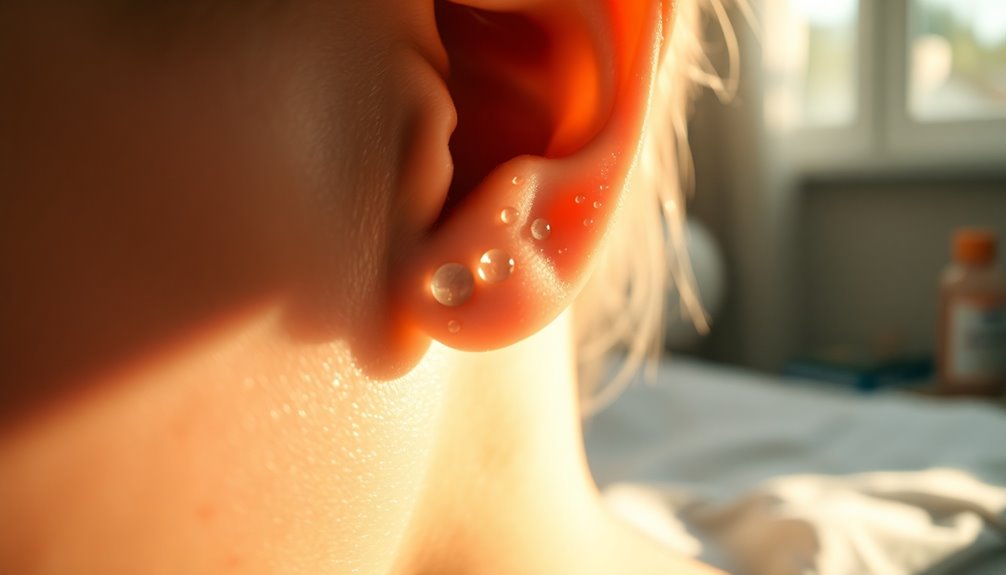
Allergies and sinus issues can greatly impact your ear health, often leading to that annoying wet sensation when you wake up. When you experience allergies, your body ramps up fluid production, which can accumulate in your ears.
If sinus issues are present, this can obstruct normal drainage, causing even more discomfort. Here are some key factors to bear in mind:
- Increased Fluid Production: Allergies trigger your body to produce more fluid, which can fill your ears.
- Obstructed Drainage: Sinus infections may block the pathways, preventing fluid from draining properly.
- Sterile Fluid Accumulation: This fluid can mimic cold symptoms, contributing to that wet feeling.
- Management Techniques: Avoiding allergens and using antihistamines can effectively reduce ear moisture.
Recognizing the connection between allergies, sinus issues, and your ear health is essential. Additionally, proper nutrition can play a crucial role in overall health and immune function, potentially reducing allergy symptoms.
By addressing these conditions, you can alleviate that persistent feeling of wetness and improve your overall comfort.
Don't ignore these symptoms—taking proactive steps can make a significant difference in your daily life.
When to Seek Professional Help

If you notice a persistent wetness in your ears when you wake up, it might be time to consult a healthcare professional. This wetness could indicate excessive earwax production, which can lead to blockage and further complications.
If you experience any unusual discharge from your ear, especially if it's accompanied by blood or pain, seek immediate medical attention.
For those with a history of chronic ear infections or frequent wax buildup, it's important to reach out for professional help at the first signs of discomfort. Symptoms like muffled hearing or a sensation of fullness in your ear often signal that you need a professional evaluation. Ignoring these signs can result in hearing loss or more severe issues.
Regular check-ups with a hearing care professional are fundamental for managing earwax-related problems and maintaining overall ear health.
Don't hesitate to schedule an appointment if you have concerns about your ear health. Taking proactive steps can prevent potential damage and guarantee you receive the proper treatment.
Your ears play an essential role in your overall well-being, so it's always better to be safe than sorry.
Frequently Asked Questions
Why Does My Ear Feel Wet Inside When I Wake Up?
When you wake up with a wet sensation in your ear, it's often due to fresh earwax accumulation.
Your body produces earwax to keep your ear canal lubricated and trap debris, and this can feel wetter than older wax. Changes in your sleeping position might also allow for drainage, contributing to that feeling.
It's usually nothing to worry about, but if it persists or hurts, you should consult a healthcare professional.
Why Do My Ears Leak Fluid in the Morning?
You wake up, and there it is—a strange fluid leaking from your ears. What could be causing this unsettling phenomenon?
It might be your sleeping position, allowing earwax or other fluids to pool. Allergies or sinus congestion could also play a role, trapping moisture in your ear.
Even extended use of earphones overnight can irritate the canal, prompting excess earwax production.
Each morning brings a mystery; unraveling it might just lead to relief.
Why Is There a Weird Wet Sound in My Ear?
You might hear a weird wet sound in your ear due to fresh earwax accumulation.
This wax can feel wetter than older, drier wax, and its production might increase if you use earbuds or hearing aids.
Additionally, moisture from humidity or temperature changes while you sleep can affect your ear canal.
If you're concerned, it's wise to consult a healthcare professional to rule out any underlying issues.
How Do You Get Rid of Fluid in Your Inner Ear?
If your inner ear feels like a vintage waterbed, you'll want to tackle that fluid pronto.
Start with gentle ear irrigation using warm water to flush out any excess. Over-the-counter decongestants can help relieve sinus pressure, easing fluid buildup.
If allergies are in play, grab some antihistamines. For stubborn cases, consider professional help, like ear microsuction.
And don't forget to keep your ears dry to prevent future issues!
Conclusion
Waking up with a wet ear can feel like a puzzle piece that doesn't quite fit. Just like a leaky faucet, it might seem minor, but it can hint at bigger issues. Whether it's earwax buildup, allergies, or simply your sleeping position, listening to your body is key. If the problem persists, don't hesitate to seek professional help. Remember, just like a garden needs care, so do your ears—they're worth nurturing for your overall well-being!
